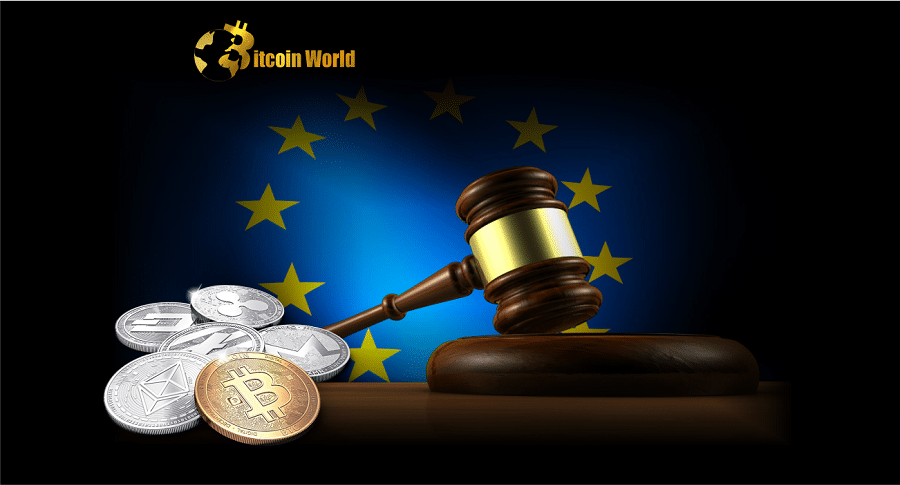Heads up, crypto enthusiasts! The European Union is stepping up its game when it comes to regulating crypto assets and tackling money laundering. You’ve probably heard whispers about new rules, and now things are moving fast. Two key committees within the European Parliament are gearing up to vote on a crucial anti-money laundering (AML) bill this Tuesday. This vote could significantly reshape the crypto landscape in the EU, impacting everything from crypto businesses to decentralized autonomous organizations (DAOs) and even your personal crypto wallets. Let’s dive into what’s happening and what it all means for you.
What’s the Buzz About? EU’s AML Package and Crypto
For quite some time now, crypto assets have been a hot topic in discussions surrounding the EU’s anti-money laundering efforts. The EU wants to ensure that the crypto world isn’t used for illicit activities, and this new AML package is a big step in that direction. Think of it as bringing crypto more firmly into the existing financial regulatory framework.
Currently, businesses offering crypto services within the EU already navigate a set of requirements. This upcoming vote signifies the AML bill’s progression, but it’s not the final whistle. Even after a potential positive committee vote, further changes are possible. To become law, the AML bill still needs to clear a plenary vote in the European Parliament and then move into inter-institutional negotiations – basically, discussions between the Parliament, the Council of the European Union, and the European Commission to finalize the details.
DAOs and DeFi in the Regulatory Spotlight
Here’s where things get particularly interesting for the decentralized space. The anti-money laundering regulations aren’t just targeting traditional crypto exchanges. They’re also casting a wider net to include decentralized autonomous organizations (DAOs) and decentralized finance (DeFi) systems.
According to a draft of the bill, DAOs and DeFi will fall under these regulations if they are “managed directly or indirectly, including through smart contracts or voting protocols, by identified natural and legal persons.” Essentially, if there’s identifiable human or legal entity control, even if it’s through decentralized mechanisms, these regulations could apply. This is a significant development as it signals the EU’s intent to bring even the most cutting-edge and decentralized aspects of crypto under regulatory oversight.
NFT Platforms: No Longer Flying Under the Radar
Remember MiCA (Markets in Crypto-Assets regulation)? It’s the EU’s landmark legislation for crypto assets, soon to be enforced. Interestingly, under MiCA, Non-Fungible Tokens (NFTs) were largely outside its scope. However, the AML bill takes a different approach. NFT platforms are explicitly recognized as “required companies” under this anti-money laundering legislation.
Why the shift? The goal is to close what regulators see as a potential “regulatory gap.” NFTs, while unique digital assets, can still be used for money laundering, and the EU wants to ensure that platforms facilitating NFT trading are also subject to AML checks.
Key Changes to Watch Out For: What Does This Mean for Crypto Transactions?
Let’s break down some of the specific measures proposed in the AML bill that could impact crypto users and businesses:
- Due Diligence for Larger Transactions: Credit and financial institutions will need to perform due diligence for cryptocurrency transactions exceeding €1,000 (approximately $1,080). This means enhanced scrutiny for larger crypto transfers to ensure they are legitimate.
- Stricter Rules for Self-Hosted Wallets: Transactions involving self-hosted wallets (wallets where you control your private keys) are facing increased scrutiny. There will be stricter due diligence procedures, particularly for transactions exceeding €1,000 used for commercial cryptocurrency payments.
- Verification for Commercial Payments from Self-Hosted Wallets: For commercial crypto payments over €1,000 originating from self-hosted wallets, the wallet owner may need to be verified. This aims to prevent anonymous commercial transactions using crypto.
- Correspondent Agreements with Non-EU Crypto Service Providers: The AML bill also includes stricter due diligence for correspondent agreements with crypto service providers based outside the EU. This is to ensure that EU regulations aren’t circumvented by using non-EU platforms.
- Ban on Anonymous Crypto Accounts: Just like anonymous bank accounts, anonymous cryptocurrency accounts would be prohibited under these regulations. This reinforces the move towards greater transparency in crypto transactions.
- Crackdown on Privacy-Enhancing Tools: Tools designed to anonymize crypto transactions, such as tumblers, mixers, and privacy wallets, are classified as “higher risk.” The European Commission will further assess whether these tools should be outright banned in the future.
What’s Next? The Road Ahead for EU Crypto Regulations
The European Commission has a mandate to review the commercial payments rule related to self-hosted wallets within three years. This review will consider advancements in areas like digital identities within the EU and the operations of the newly proposed Anti-Money Laundering Authority. This indicates that the regulatory landscape for crypto is not static and will continue to evolve as technology and the market develop.
In a Nutshell: Increased Scrutiny and a Push for Compliance
The EU’s anti-money laundering package signals a clear direction: increased regulatory scrutiny for the crypto industry. While the details are still being finalized, the overarching message is that the EU wants to foster innovation in the crypto space while simultaneously mitigating the risks of money laundering and illicit finance.
For crypto businesses operating in the EU, this means preparing for more stringent compliance requirements. For individuals, it highlights the growing importance of understanding and adhering to evolving regulations, particularly when using self-hosted wallets for larger transactions. The upcoming committee votes are a crucial step in this regulatory journey, and the crypto world will be watching closely to see what the final rules will look like.
Disclaimer: The information provided is not trading advice, Bitcoinworld.co.in holds no liability for any investments made based on the information provided on this page. We strongly recommend independent research and/or consultation with a qualified professional before making any investment decisions.




